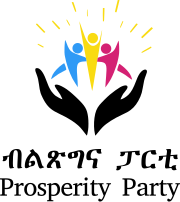
Prosperity Party
 | |
| President | Abiy Ahmed |
| Vice-Presidents | Adem Farah Temesgen Tiruneh |
| Founded | 1 December 2019 |
| Merger of | ADP ANDP APDO BGPDUF ESPDP GPDM HNL ODP SEPDM |
| Preceded by | EPRDF |
| Headquarters | Addis Ababa |
| Newspaper | New Vision |
| Membership (2022) | |
| Ideology | |
| Political position | Centre[8][9] |
| House of Peoples' Representatives | 410 / 547 Nebe, Nebe
|
| Website | |
| prosperity | |
The Prosperity Party (Amharic: ብልጽግና ፓርቲ, romanized: Bilits’igina Paritī; Oromo: Paartii Badhaadhiinaa) is a ruling political party in Ethiopia that was established on 1 December 2019 as a successor to the Ethiopian People's Revolutionary Democratic Front by incumbent Prime Minister Abiy Ahmed.

The merger into a countrywide party is part of Abiy's general policy of distancing the country's politics from ethnic federalism.[10] The party ran for the first time in the 2021 general election.

History
After being elected in 2018, Ethiopian Prime Minister Abiy Ahmed began carrying out significant reforms that aimed to merge Ethiopia's ethnic parties and reduce the influence of the Tigrayan Peoples Liberation Front (TPLF), as the organization had dominated the ruling Ethiopian People's Revolutionary Democratic Front (EPRDF) political coalition since the fall of the Derg regime in 1991.[11]

The Prosperity Party (PP) was formed and formally recognized by the National Electoral Board of Ethiopia (NEBE) in December 2019 through the merging of three member parties of the EPRDF. These were the Amhara Democratic Party (ADP), the Oromo Democratic Party (ODP) and the Southern Ethiopian People's Democratic Movement (SEPDM). Also included in the merger was the Afar National Democratic Party (ANDP), the Benishangul-Gumuz People's Democratic Unity Front (BGPDUF), the Ethiopian Somali People's Democratic Party (ESPDP), the Gambela People's Democratic Movement (GPDM) and the Hareri National League (HNL).[12][13] The merger was approved by the executive committee of the EPRDF. In November 2019 Abiy tweeted:

The unanimous decision passed today to merge the Party is a crucial step in harnessing our energy to work toward a shared vision. Prosperity Party is committed to strengthening & applying a true Federal system which recognizes the diversity and contributions of all Ethiopians.[14]
Notably, the powerful Tigrayan Peoples Liberation Front viewed the merger as illegal and was not party to it.[15] Abiy directly called on the TPLF to dissolve and become part of the Prosperity Party, which precipitated the TPLF shifting its personnel and resources from the nation's capital of Addis Ababa to the Tigray regional state capital of Mekelle during 2020.[16]

Program and ideology
The Prosperity Party has been seen as supporting Ethiopian civic nationalism due to the merger of the Oromo Democratic Party with the Amhara Democratic Party, Argoba People's Democratic Organization, Benishangul-Gumuz People's Democratic Unity Front, Ethiopian Somali People's Democratic Party, Gambela People's Democratic Movement, Afar National Democratic Party, Hareri National League, and the Southern Ethiopian People's Democratic Movement ethnicity-based political parties into the new multi-ethnic party, thus moving these predecessor parties away from their ethnic nationalist and pro-ethnic federalism past into a party that promotes a unified Ethiopian national identity and non-ethnicity based federalism. However, this has been seen by opponents as steps towards the possibility of taking political powers based on group rights away from the various ethnic groups, while proponents see it as a way to move Ethiopian politics and governmental administration away from ethnicity-based identity politics, supporting the individual rights of each person, to mitigate the rise of ethnic nationalism, to foster national unity and solidarity, and to include in the democratic process political parties of several ethnic groups and regions that were once deemed too inferior by the TPLF-led Ethiopian People's Revolutionary Democratic Front regime to fully join the one-party dominated coalition government or be full partakers in revolutionary democracy because of their largely pastoralist way of life.[17][18][19][20][21]

With the formation of the Prosperity Party in 2019, Abiy Ahmed promised to redress the marginal status of the regional states in the Ethiopian periphery. Satellite parties that represented so-called ‘emerging’ regions, including Afar, Somali, Benishangul-Gumz and Gambella, were promised equal representation and became part of the ruling PP.[22]

Symbols
The party's logo consists of two black hands holding three human figures (one blue, one yellow, and one pink), with sun rays shooting outwards from the human figures.

Internal organisation and ethnic tensions within the party
The Prosperity Party (PP) exists along ethnic lines. There is an Amhara PP (APP), an Oromo PP (OPP), a Somali PP (SPP), a Sidama PP (SPP), and a Tigrayan PP, led by Nebiyou Shulmichael[23] and of which Abraham Belay[24] and Mulu Nega are prominent members. Many other ethnic groups have their own PP branch as well. There exists a substantial divide between the Oromo and Amhara wings of the party, with academic Tobias Hagmann noting that the two sides are largely kept together through opposition to the TPLF.[25]

The Tigrayan PP is in strong conflict with the TPLF as it has supported Abiy Ahmed in the Tigray War. Due to this war, the Tigray PP has become isolated in Tigrayan public opinion to the point that one of the regional PP leaders, Abraham Belay, was forbidden by his own mother to visit her house and her neighbourhood.[26] In March 2021, the Oromia Prosperity Party (OPP) and Amhara Prosperity Party (APP) came with opposite statements, each blaming the other for being the cause of violence and killings.[27][28]

Electoral performance
House of Peoples' Representatives
| Election | Leader | Seats | Government | |
|---|---|---|---|---|
| Seats | +/- | |||
| 2021 | Abiy Ahmed | 410 / 483
|
Majority | |
Criticism
The Prosperity Party has been increasingly accused of spreading anti-intellectualism as well as the cult of personality of premier and party chief Abiy Ahmed, dubbed the "Prosperity Party Gospel", a term evoking the prosperity gospel philosophy. Its members also accused of propagating fallacious statements regardless of reality behind the current Ethiopian situation such as periodical intrastate conflicts.[29][30][31]

References
- ^ Kana, Lauriane (12 March 2022). "Ethiopian PM Abiy calls for peace at launch of party's first congress". Retrieved March 12, 2022.
- ^ Yibeltal, Kalkidan (22 November 2019). "Ethiopia's Abiy Ahmed gets a new ruling party". BBC News.
- ^ Gerth-Niculescu, Maria. "Can PM Abiy Ahmed breach Ethiopia's ethnic divide?". Deutsche Welle.
- ^ Gedamu, Yohannes. "Why Abiy Ahmed's Prosperity Party is good news for Ethiopia". www.aljazeera.com.
- ^ "Ethiopia • Africa Elects".
- ^ "Populism in Ethiopia?".
- ^ "The Tigray Dilemma".
- ^ Habtewold, Melaku (December 24, 2019). "Why Prosperity Party is needed" – via www.ethiopia-insight.com.
- ^ "Who Will Win the Next Ethiopian Elections?". January 10, 2020 – via www.ezega.com.
- ^ "Highlight 17/2021 - The Fallout of Ethnic Federalism". MEIG Programme. MEIGprogramme. 12 May 2021. Retrieved 30 July 2021..
- ^ Jima, Abdisa Olkeba (2023-12-31). "Ethiopian political crisis after reform: Causes of Tigray conflict". Cogent Social Sciences. 9 (1). doi:10.1080/23311886.2023.2209991. ISSN 2331-1886.
- ^ "The EPRDF Officially Ends; The Prosperity Party Begins". Ezega News. 2019-12-26. Archived from the original on 2020-12-16. Retrieved 2020-12-16.
- ^ Gedamu, Yohannes (13 December 2019). "The new political party of Ethiopia's led by Abiy faces significant hurdles". Quartz Africa. Quartz. Retrieved 5 January 2020.
- ^ "Ethiopia's ruling coalition agrees to form single party ahead of 2020 vote". Reuters. 21 November 2019. Retrieved 11 January 2020.
- ^ "Exclusive: Third day EPRDF EC discussing "Prosperity Party" Regulation. Find the draft copy obtained by AS". 18 November 2019. Archived from the original on 3 May 2021. Retrieved 21 November 2019.
- ^ Dessie, Wubante Ayalew; Belete, Simeneh Bires; Dagnew, Agenagn Kebede (1 August 2024). "The conflict between the Tigray People Liberation Front (TPLF) and the Federal Democratic Republic of Ethiopia (FDRE): Special emphasis on the Pretoria Agreement". African Security Review: 1–17. doi:10.1080/10246029.2024.2379902. ISSN 1024-6029 – via Taylor and Francis.
- ^ Allo, Awol K. "How Abiy Ahmed's Ethiopia-first nationalism led to civil war". www.aljazeera.com. Retrieved 2021-01-20.
- ^ "Context and Updates on Current Issues in Ethiopia". Embassy of Ethiopia, London. 2020-07-08. Retrieved 2020-12-16.
- ^ Gedamu, Yohannes (13 December 2019). "The new political party of Ethiopia's Abiy holds much promise but faces significant hurdles". Quartz Africa. Retrieved 2021-01-20.
- ^ Gebreluel, Goitom. "Analysis | Ethiopia's prime minister wants to change the ruling coalition. Who's getting left out?". Washington Post. ISSN 0190-8286. Retrieved 2021-01-24.
- ^ Mamdani, Mahmood (2019-01-03). "Opinion | The Trouble With Ethiopia's Ethnic Federalism (Published 2019)". The New York Times. ISSN 0362-4331. Retrieved 2021-01-24.
- ^ Wedekind 2024, p. 10.
- ^ Ethiopian News Agency, 29 December 2020.Tigray Prosperity Party Inaugurates Office in Mekelle
- ^ New Business Ethiopia, 19 February 2020: Abiy meets Prosperity Party leaders from Tigray
- ^ Hagmann, Tobias (November 23, 2021). "Ethiopia's civil war: Five reasons why history won't repeat itself". The Conversation. Retrieved November 23, 2021.
- ^ Jan Nyssen, 2021. The situation in Tigray at the beginning of 2021. Preprint for HBS.[self-published source]
- ^ Addis Standard, 24 March 2021: Amhara & Oromia PP engage in war of words as relative peace returns to violence hit areas
- ^ Addisstandard (2021-03-22). "News: Unknown number of people killed in ongoing violence in Oromia Special Zone and North Shewa Zone, Amhara region as warring factions trade blame". Addis Standard. Retrieved 2021-03-24.
- ^ Balehegn, Mulubrhan (2021-04-04). "The politics and problems of Prosperity Party Gospel". Ethiopia Insight. Retrieved 2023-12-10.
- ^ "The Prosperity Party News, Research and Analysis". The Conversation. 2020-11-30. Retrieved 2023-12-10.
- ^ Admin (2021-01-16). "The ruling party claims ten million members amid criticism over Benishangul". Borkena Ethiopian News. Retrieved 2023-12-10.
Works cited
- Wedekind, Jonah (2024). Prosperity to the Periphery? The Politics of Resource Extraction in Ethiopia, Post-2018 (PDF) (Report). Rift Valley Institute.
See what we do next...
OR
By submitting your email or phone number, you're giving mschf permission to send you email and/or recurring marketing texts. Data rates may apply. Text stop to cancel, help for help.
Success: You're subscribed now !

